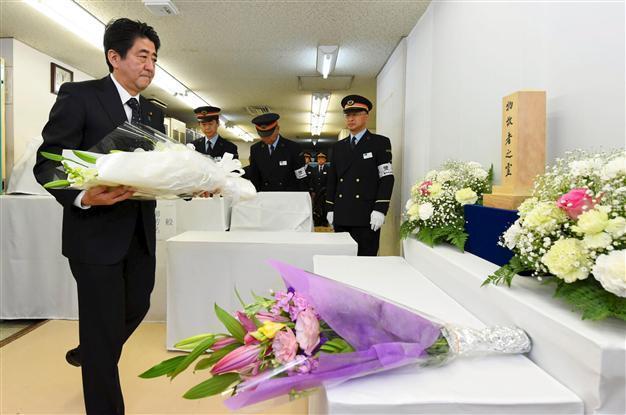Japan remembers subway gas attack, 20 years on
TOKYO - Agence France-Presse

Japan's Prime Minister Shinzo Abe offers flowers to victims of the sarin poison gas attack on the subway system by members of the AUM Shinrikyo cult, which killed 13 people and injured more than 6,000 at the Tokyo subway's Kasumigaseki station March 20, 2015. REUTERS Photo.
Japan marked the 20th anniversary on March 20 of coordinated attacks on the Tokyo subway system, when a doomsday cult released a Nazi-developed nerve gas on packed trains, killing 13 people and injuring 6,000.
At Kasumigaseki, one of the hardest hit subway stations, staff and relatives of some of those who died in the biggest attack on post-WWII Japan fell silent at 8:00 am to remember those who were lost and those still affected.
"Twenty years have passed but I think the victims are still suffering," said Fumiko Suzuki, who was there to pay tribute to a friend made ill by the invisible clouds of sarin that spread through rush-hour trains.
"We should not forget about the attack."
Prime Minister Shinzo Abe also visited the station in the afternoon to place flowers in memory.
"I offered my condolences to the victims as we marked the 20th anniversary of the attack," he said.
"The incident isn't over yet because many are still suffering from the after-effects of the sarin."
Thirteen members of the Aum Supreme Truth cult remain on death row for their part in the March 20, 1995 terror and for other murders and kidnappings the group carried out.
Cult leader Shoko Asahara, a blind mystic who espoused a blend of Hinduism and Buddhism, was convicted of ordering five teams of followers to dump packets of sarin on trains, puncturing them with the sharpened tip of an umbrella.
Thousands of commuters were unknowingly exposed to the colourless, odourless nerve gas, which even in low doses can cause paralysis of the lungs and neurological damage.
Some died almost instantly, while others suffered gradually worsening symptoms.
More than 6,000 people were treated in hospital after having inhaled sarin -- an agent developed in Nazi Germany and used by Saddam Hussein against the Kurds in Iraq.
Kasumigaseki station master Mitsuaki Ota led tributes to Tokyo Metro worker Kazumasa Takahashi who unknowingly picked up a punctured packet of the nerve gas from the floor of one of the trains.
He and another colleague died.
"I'd like to offer my deep condolences to those who died, and I'm praying from the bottom of my heart for the quick recovery of those who are still suffering," Ota said.
Takahashi's widow, Shizue, told reporters that the 20th anniversary of the attack should serve as a wake-up call over the risk of terrorism.
"It's possible we'll face the danger of terror attacks. I want (Japanese people) to be more aware," she said after laying a flower on a makeshift altar.
Her comments came after three Japanese tourists were among 21 people killed when gunmen stormed a museum in the Tunisian capital.
Chief Cabinet Secretary Yoshihide Suga said at a regular press conference that the government would do its best to prevent similar attacks from happening.
The final trial relating to the episode is under way, with Katsuya Takahashi facing a murder charge following his arrest in 2012 after years on the run.
But after two decades, the exact reasons behind the incident remain opaque.
Prosecutors said Asahara, now 60 years old, had become paranoid that the authorities were coming to close down his sprawling cult compound at the foot of Mount Fuji, and ordered the subway attack to disrupt attempts to capture him.
Japan still puzzles over why the cult, which had 10,000 members at the height of its popularity, was able to attract some of the country's brightest minds, including scientists and doctors who had graduated from top universities.
